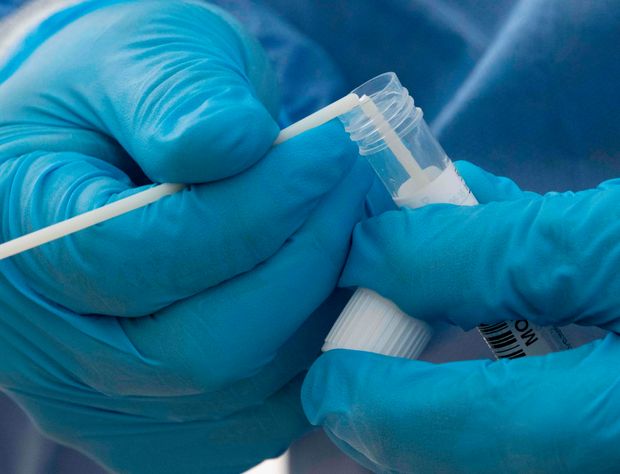
Facilities with the capacity to process 600,000 diagnostic checks a day are set to open in the Midlands in England and in Scotland in early 2021.
thomas kienzle/Agence France-Presse/Getty Images
Two new “mega-labs” will open in early 2021 in the U.K., in an attempt to double testing capacity in the U.K., the government said.
The new facilities, one in Leamington Spa in the Midlands in England and another in an unidentified site in Scotland, will employ up to 4,000 people and increase the number of standard polymerase chain reaction tests by 600,000 a day when operating at full capacity.
Current testing capacity is at around 519,000, according to the latest data. However, just 379,955 tests were actually processed.
As well as processing COVID-19 tests, these new diagnostic facilities will be used for critical illness including cancer, cardiovascular and metabolic diseases, according to the Department and Health Social Care.
Health secretary Matt Hancock said the boost in diagnostic capabilities would strengthen the U.K.’s infrastructure to respond to future epidemics, as well as improve care for other critical illnesses, including cancer and cardiovascular and metabolic diseases.
“We didn’t go into this crisis with a significant diagnostics industry, but we have built one, and these two mega labs are another step forward,” Hancock said.
“Transforming the U.K.’s diagnostic facilities is not only essential to beating this virus, but it is necessary to build back better — so we are better prepared in future for testing on a massive scale,” he added.
Read: The entire city of Liverpool is set to be tested for COVID-19 in bid to break lockdown cycle
Cutting-edge technology made by British manufacturers will be used in both labs, including automation, robotics and consumables. “This means more tests will be processed more quickly and at a lower cost, and therefore faster turnaround times for test results,” the DHSC said.
A recruitment drive has already started for the Leamington Spa lab, and a campaign is due to start shortly in Scotland once details of the site are confirmed, the government said.
The U.K. already has five Lighthouse laboratories in Milton Keynes, Alderley Park, Glasgow, Cambridge and Newport, with others being set up in Newcastle, Plymouth and Brants Bridge.
News of the two new mega labs comes after Uğur Şahin, chief executive of German biotech BioNTech BNTX, +4.30%, whose vaccine candidate is being developed in partnership with Pfizer PFE, +2.85%, said on Sunday that he was “very confident” the experimental shot could halve transmission of the virus, resulting in a “dramatic reduction in cases”.
Şahin told the BBC his aim was for normality to return next winter, with the vaccine program rolled out throughout 2021.
On Sunday, the U.K. government announced another 24,962 confirmed COVID cases as well as a further 168 deaths within 28 days of a positive test.
BioNTech and the U.S. drugmaker Pfizer last week announced that their jointly developed vaccine candidate has been found to be 90% effective in a late-stage clinical trial — the final stage before commercial licensing.
The U.K. is expected to receive 10 million doses of the BioNTech/Pfizer vaccine by the end of the year, with a further 30 million doses already ordered. The jab is given in two doses, three weeks apart.
Separately, the National Health Service announced on Nov. 15 that it is launching 40 clinics specializing in “long COVID,” which are due to start opening at the end of November.
The condition, which is thought to affect more than 60,000 people in the U.K., can cause continuing fatigue, brain fog, breathlessness, and pain.
10 sites have been earmarked for the Midlands, seven in the North East, six in the East of England, South West and South East respectively, five in London and three in the North West, the NHS said.
A study published on Oct. 21 from King’s College London found that older people, women, and those with a greater number of different symptoms in the first week of their illness were more likely to develop “long COVID,” with one in 10 still unable to shake off the side effects eight weeks after infection.









